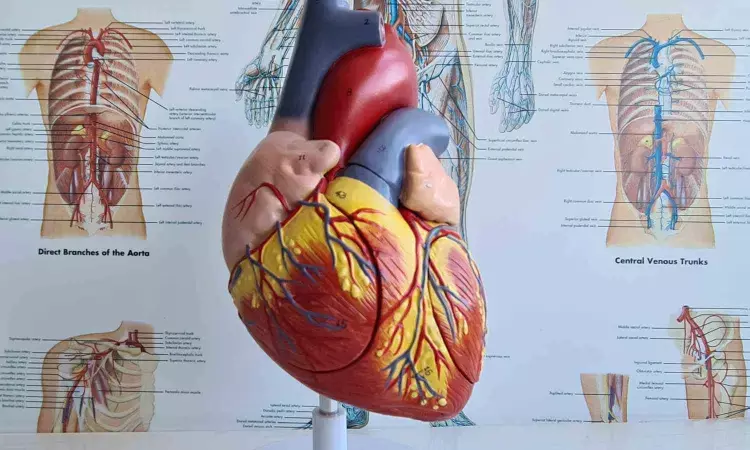- Home
- Medical news & Guidelines
- Anesthesiology
- Cardiology and CTVS
- Critical Care
- Dentistry
- Dermatology
- Diabetes and Endocrinology
- ENT
- Gastroenterology
- Medicine
- Nephrology
- Neurology
- Obstretics-Gynaecology
- Oncology
- Ophthalmology
- Orthopaedics
- Pediatrics-Neonatology
- Psychiatry
- Pulmonology
- Radiology
- Surgery
- Urology
- Laboratory Medicine
- Diet
- Nursing
- Paramedical
- Physiotherapy
- Health news
- Fact Check
- Bone Health Fact Check
- Brain Health Fact Check
- Cancer Related Fact Check
- Child Care Fact Check
- Dental and oral health fact check
- Diabetes and metabolic health fact check
- Diet and Nutrition Fact Check
- Eye and ENT Care Fact Check
- Fitness fact check
- Gut health fact check
- Heart health fact check
- Kidney health fact check
- Medical education fact check
- Men's health fact check
- Respiratory fact check
- Skin and hair care fact check
- Vaccine and Immunization fact check
- Women's health fact check
- AYUSH
- State News
- Andaman and Nicobar Islands
- Andhra Pradesh
- Arunachal Pradesh
- Assam
- Bihar
- Chandigarh
- Chattisgarh
- Dadra and Nagar Haveli
- Daman and Diu
- Delhi
- Goa
- Gujarat
- Haryana
- Himachal Pradesh
- Jammu & Kashmir
- Jharkhand
- Karnataka
- Kerala
- Ladakh
- Lakshadweep
- Madhya Pradesh
- Maharashtra
- Manipur
- Meghalaya
- Mizoram
- Nagaland
- Odisha
- Puducherry
- Punjab
- Rajasthan
- Sikkim
- Tamil Nadu
- Telangana
- Tripura
- Uttar Pradesh
- Uttrakhand
- West Bengal
- Medical Education
- Industry
Routine Protamine Use Enhances Hemostasis and Reduces Vascular Complications After TAVI: ACE-PROTAVI Trial

Australia: The routine use of protamine enhances hemostasis following transfemoral transcatheter aortic valve implantation (TAVI) procedures, findings from ACE-PROTAVI randomized clinical trial have shown. The study, published in the journal JAMA Cardiology elucidates the promising results of protamine administration after transfemoral TAVI by promoting hemostasis and decreased time to hemostasis (TTH).
"In the ACE-PROTAVI randomized clinical trial, involving 410 patients across three Australian hospitals, routine administration of protamine after TAVI resulted in a higher rate of successful hemostasis and a reduced risk of vascular complications compared to placebo," the researchers reported.
Transfemoral transcatheter aortic valve implantation is a minimally invasive procedure used to replace a damaged or diseased aortic valve in the heart. Vascular complications following transfemoral TAVI continue to be a significant source of procedure-related complications. Routine use of protamine to reverse anticoagulation at the end of transfemoral TAVI may help decrease these complications, although there is limited data available.
To evaluate the efficacy and safety of routine protamine administration after transfemoral TAVI, scientists conducted an ACE-PROTAV randomized clinical trial.
For this trial, Pieter A. Vriesendorp, Heart Centre, The Alfred Hospital, Melbourne, Australia, and the team recruited 410 patients from 3 Australian hospitals between December 2021 and June 2023 with a 1-year follow-up period.
All patients accepted for transfemoral TAVI by a multidisciplinary heart team were eligible for enrollment. Eligible patients were randomized 1:1 between routine protamine administration and placebo. Out of 410 patients, 199 patients were in the protamine group and 211 in the placebo group. Measurements were done using odds ratios(ORs)
The study results reveal:
- The median (IQR) patient age in the protamine group was 82 (77-85) years, and 68 of 199 patients receiving protamine (34.2%) were female.
- The median (IQR) patient age in the placebo group was 80 (75-85) years, and 89 of 211 patients receiving the placebo (42.2%) were female.
- Patients who received protamine administration at the start of the procedure experienced a higher rate of successful hemostasis (97.9% in 188 of 192 patients) compared to those who received a placebo (91.6% in 186 of 203 patients), with an absolute risk difference of 6.3%
- The median time to hemostasis (TTH) was shorter for those given protamine upfront, with a median of 181 seconds (IQR 120-420) compared to 279 seconds (IQR 122-600) for the placebo group.
- Routine administration of protamine led to a lower risk of the composite outcome in the protamine group (5.2% in 10 of 192 patients) compared to the placebo group (12.8% in 26 of 203 patients), with an odds ratio of 0.37.
- This reduction was mainly due to a lower rate of minor vascular complications in the protamine group. Additionally, no adverse events were linked to the use of protamine.
“The advantages of protamine were evident in decreased minor vascular complications, shorter procedural time, and reduced post-procedural hospital stay for patients who received routine protamine compared to those who received a placebo,” researchers concluded.
Reference: Vriesendorp PA, Nanayakkara S, Heuts S, et al. Routine Protamine Administration for Bleeding in Transcatheter Aortic Valve Implantation: The ACE-PROTAVI Randomized Clinical Trial. JAMA Cardiol. Published online August 14, 2024. doi:10.1001/jamacardio.2024.2454
BDS, MDS(orthodontics)
Dr. Garima Soni holds a BDS (Bachelor of Dental Surgery) from Government Dental College, Raipur, Chhattisgarh, and an MDS (Master of Dental Surgery) specializing in Orthodontics and Dentofacial Orthopedics from Maitri College of Dentistry and Research Centre. At medical dialogues she focuses on dental news and dental and medical fact checks against medical/dental mis/disinformation
Dr Kamal Kant Kohli-MBBS, DTCD- a chest specialist with more than 30 years of practice and a flair for writing clinical articles, Dr Kamal Kant Kohli joined Medical Dialogues as a Chief Editor of Medical News. Besides writing articles, as an editor, he proofreads and verifies all the medical content published on Medical Dialogues including those coming from journals, studies,medical conferences,guidelines etc. Email: drkohli@medicaldialogues.in. Contact no. 011-43720751


